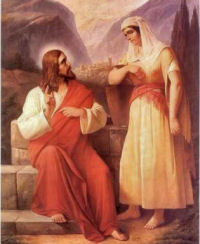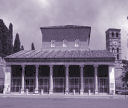
Daily Readings for:March 23, 2014
(Readings on USCCB website)
Collect: O God, author of every mercy and of all goodness, who in fasting, prayer and almsgiving have shown us a remedy for sin, look graciously on this confession of our lowliness, that we, who are bowed down by our conscience, may always be lifted up by your mercy. Through our Lord Jesus Christ, your Son, who lives and reigns with you in the unity of the Holy Spirit, one God, for ever and ever.
RECIPES
o Spring, Fall or Winter Sunday Dinner Menu
ACTIVITIES
o Explaining the Mass and Sacraments
PRAYERS
o Prayer for the Third Week of Lent
o Book of Blessings: Blessing Before and After Meals: Lent (1st Plan)
LIBRARY
o I Will Arise and Return to My Father | Pope John Paul II
· Lent: March 23rd
· Third Sunday of Lent
Old Calendar: Third Sunday of Lent
Jesus answered and said to her, "Everyone who drinks this water will be thirsty again; but whoever drinks the water I shall give will never thirst; the water I shall give will become in him a spring of water welling up to eternal life. The woman said to him, "Sir, give me this water, so that I may not be thirsty or have to keep coming here to draw water." Jesus said to her, "Go call your husband and come back" (Jn 4:13-16).
The feast of St. Turibius of Mongrovejo which is ordinarily celebrated today is superseded by the Sunday Liturgy.
Click here for commentary on the readings in the Extraordinary Form of the Roman Rite.
Sunday Readings
The first reading is taken from the Book of Exodus 17:3-7. The Israelites, the Chosen People of God, were suffering slavery and the threat of total extermination in Egypt; God miraculously set them free and, with Moses as their leader, he led them towards the promised land of Canaan. But they soon forgot what God had done for them and began to murmur and rebel because of the difficulties of the long desert journey. One of these rebellious murmurings is put before us today.
The second reading is from the St. Paul's Letter to the Romans 5:1-2; 5-8. This brief section is an encouragement to all who have been given the gift of the Christian faith to persevere in spite of adversity.
The Gospel is from St. John 4:5-42. This gospel, about the Samaritan woman, is exceptionally rich. Every time we read it we are passionately moved by that intense conversation between Jesus and the Samaritan woman. The Holy Father, Pope Benedict XVI, recalling the great teaching of Saint Augustine, with regard to Christ's request to the woman, “give me something to drink”, said: “Yes, God thirsts for our faith and our love. As a good and merciful father, he wants our total, possible good, and this good is he himself. The Samaritan woman, on the other hand, represents the existential dissatisfaction of one who does not find what he seeks. She had "five husbands" and now she lives with another man; her going to and from the well to draw water expresses a repetitive and resigned life. However, everything changes for her that day, thanks to the conversation with the Lord Jesus……” (Benedict XVI, Angelus 24 February 2008).
To recognize that if we entrust ourselves to God, we receive every “possible good” which, as the Pope reminds us, is God himself, means living the dynamic of conversion to God: renouncing a self-centered mentality, which deceives self-sufficient man, in order to receive the gift of God. Man without God is inevitably destined to dissatisfaction, limited in everything by his own limits as a creature, even in “giving himself” or “obtaining for himself” joy, love, happiness… Man without God cannot think to reach boundless joy, unlimited and eternal love, the living water of which, precisely, Jesus speaks with the Samaritan woman.
Happiness, another word for the living water, can only be given by the One who possesses it, and man does not possess it. God alone can share it with those who place their trust in Him and follow Him.
The living water, the gift of the Holy Spirit, can only be given by the Lord Jesus whom the Father sent into the world to give to all men and women eternal life, that is, never ending happiness. As the Pope reminds us “only the water that Jesus offers, the living water of the Spirit, can quench” man's “thirst for the infinite” (Benedict XVI, homily 24 February 2008). Man is able to give his fellow humans, affection, money, power, human glory, honor, career … but not endless happiness which, since it is an unlimited good, belongs to the divine, infinite sphere!
The living water flows only from the divine source. The Samaritan woman went to a well which was deep, but limited, whereas unlimited was her thirst for happiness and love. The woman, the Holy Father tells us, “ represents the existential dissatisfaction of one who does not find what he seeks”. How often man seeks the infinite, the eternal, well-being…but sadly continues to seek it in a well, in a reality, the earthly reality, which is unable to contain it. How many wells, deep but empty, how many wells of stagnant water, we have met on our way! We carry within us immense desires and easily deceive ourselves that we can meet them.
On our path of conversion, what a great grace it is to find the Lord Jesus waiting patiently for us beside our senseless wells. When, like the Samaritan woman, we are tired of the things of this world, of almost empty wells, then the Divine Master is especially close to us. He asks us to give him something to drink, he asks us to trust Him to satiate our heart and if we trust in Him we discover the joy of finding the true well, the source of crystal clear water.
Then, as if in a dream, as it was for the Samaritan woman, everything which before was important, no longer counts, true reality is something else, it becomes that Man-God who begs to give Himself! The secret of happiness is to invert the process of selfishness: to forget self in order to make room for Another Person, the Lord of life and happiness. Give up self and find God! If I renounce sin, I find grace, if I renounce myself, I find God and my brothers and sisters. “If you only knew what God is offering,” happiness is what He wants to give you! How often a priest should ask himself this question, or a woman who wonders “shall I have a child or not”, “am I thinking of myself, or of the child who cannot come into the world without my help?" If you knew what gift of Life, you would throw yourself into that well and there you would find the strength to renounce self.
Mother Teresa of Calcutta, with wisdom typical of saints, explained why we should give ourselves to God: “Why should we give ourselves completely to God? Because God has given Himself to us. If God who owes us nothing is ready to give us nothing less than Himself, can we respond with only a small part of ourselves? Giving ourselves totally to God is a way of receiving God. I am for God and God is for me. I live for God and renounce myself, in this way I allow God to live for me. To possess God we must allow Him to possess our souls. (Blessed Teresa di Calcutta).
— Mgr Luciano Alimandi, Ave Maria, Agenzia Fides 27/2/2008

The Station is in the basilica of St. Lawrence outside the walls. The name of this, the most celebrated of the martyrs of Rome, would remind the catechumens that the faith they were about to profess would require them to be ready for many sacrifices. In the primitive Church, the third Sunday in Lent was called Scrutiny Sunday, because it was on this day that they began to examine the catechumens, who were to be admitted to Baptism on Easter night.